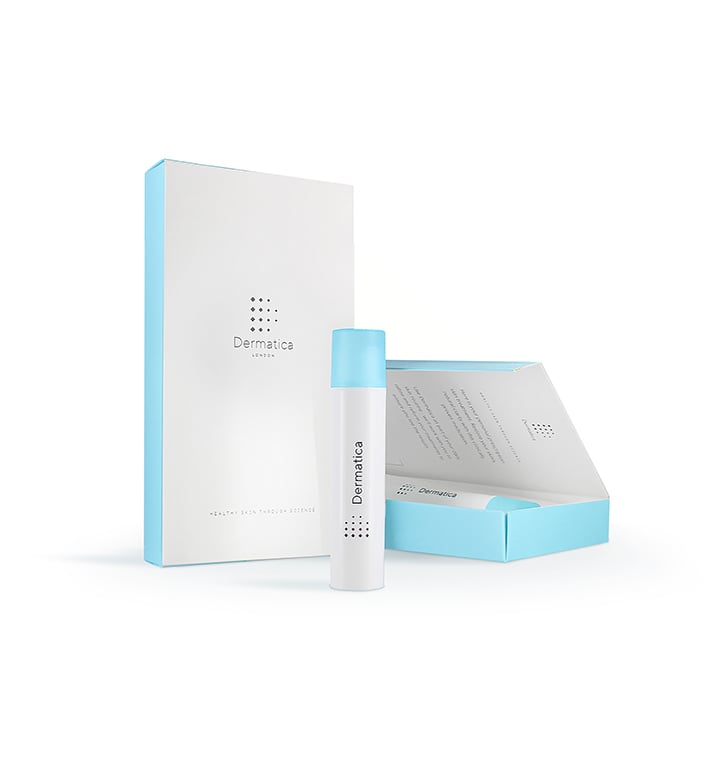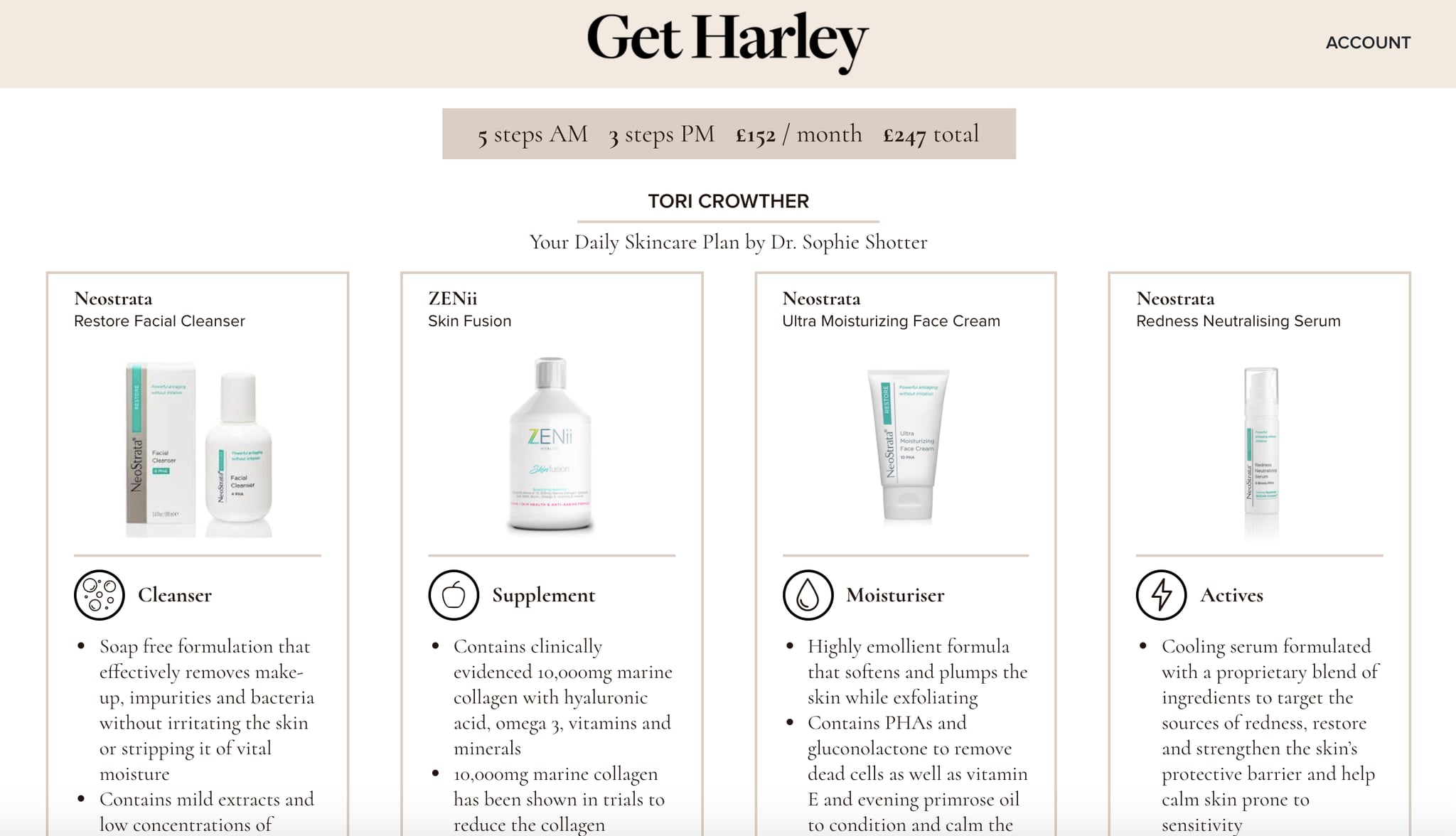
Image Source: Getty / Westend61 [1]
As of April 2019, there were only 580 dermatology consultants registered in the UK [2]. With a population of 66 million and approximately 54 percent of that population affected by skin conditions each year [3], it leaves the call to action to "visit your dermatologist" a little redundant. It's a phrase that we hear and read time and time again with the same casual tone that might be used when talking about visiting your GP. Yet visiting a dermatologist (for the most part) is not free in the same way visiting your GP on the NHS is. Practices aren't easily accessible (especially for those living outside of big cities), and it isn't always particularly easy to find the right dermatologist for your specific skin concerns. A new crop of online dermatology platforms and programs, however, sets out to solve these issues of affordability and accessibility and ultimately change the way the United Kingdom handles skin health.
First Off, Why Do We Need to See Dermatologists at All?
You might be wondering why we need dermatologists at all, especially when visiting the GP is, generally speaking, much less of a hassle. Dermatologists are experts in conditions relating to our biggest organ: the skin. To become a consultant dermatologist (the highest level of expertise in the field), they must attend medical school before moving through a highly specialised training and certification program in order to become a physician who exclusively treats and performs surgery relating to the skin, which in total takes approximately 10 years to complete. There is no one better equipped to tell you about the ins and outs of the skin than a dermatologist.
In the NHS, potentially life-threatening skin concerns, such as moles that could develop into skin cancer, are (rightly) prioritised. Cosmetic skin issues (rosacea, acne, wrinkles, etc.), on the other hand, are not, and unlike countries such as the United States, which has an entirely privatised healthcare system, dermatology clinics that specialise in cosmetic skin conditions aren't as abundant here in the UK. It's for this reason that concerns with rosacea or hyperpigmentation can often go untreated, or worse: self-diagnosed. It doesn't help the fact that many Brits are prone to just "cracking on with it" and viewing the desire to remedy skin conditions as a pursuit of vanity.
This doesn't mean non-life-threatening skin conditions aren't important, though. People with long-term acne issues, for example, may suffer psychologically, with studies finding that "acne can negatively impact self-perceptions and social and emotional functioning," [4] a fact that should not be overlooked. Then there's the physical discomfort that comes with issues like cystic acne or eczema, something intervention from an expert can help alleviate.
Dermatologists can offer patients the latest, well-researched treatments; tailor skin-care and treatment plans based on individual conditions and budgets; and delve deep into the root causes of conditions. Frankly, they know their sh*t, and they can offer specialist help. "If you are suffering with your skin, there are always solutions," Dr Anjali Mahto [5], consultant dermatologist at London's Cadogan Clinic [6], told POPSUGAR. You just have to know where to look.
"Despite acne and other skin health issues being some of the most prevalent health concerns in the UK, we found that very few people actually seek the professional help they require."
What Are Online Dermatologists?
To see a dermatologist in person, you are generally required to visit your GP so they can refer you to a specialist. However, following NHS cutbacks, these referrals are generally reserved for those with severe skin conditions and are often offered when all other options have been exhausted. From here, if you are unsuccessful with the NHS route, you will either have to seek private health insurance or privately book an in-clinic appointment. But seeking help outside of your GP office comes at a cost — approximately £200 for an hour session in London's Harley Street — and that is where online dermatology services come in.
Telehealth and online dermatology are still fairly new concepts in the UK, but in the midst of a pandemic where stay-at-home orders are still in place [7], it's never been more convenient to speak to a medical professional at home. Following the outbreak of the coronavirus, beauty brands began offering digital appointments [8] and dermatology clinics started providing virtual consultations for existing patients, but this doesn't solve some of the major issues at hand. Dermatology appointments are still expensive and difficult to access if you're not already a patient, and beauty brand consultations might lack the specific medical expertise you require (and will most likely only recommend products from their range to you).
For the most part, new and emerging online dermatology platforms solve these dilemmas. They offer unbiased prescription services at the click of a button, with products delivered straight to your door. I tried two of these services to get firsthand knowledge of how they work.
Dermatica London
Founded by Dwayne D'Souza, Dermatica [9] is an online dermatology service that offers fast access to medical-grade products, which have been prescribed specifically for you by expert dermatologists, pharmacists, and formulation scientists. "At Dermatica, we blend our own formulas for each patient individually, so that each patient receives the optimal combination of ingredients to treat their skin," D'Souza explained.

Image Source: Dermatica [10]
D'Souza realised that access to dermatology through the NHS is extremely restricted for those who are unable to get a referral if their condition isn't deemed serious enough. "I set up Dermatica as I believe that everyone should have access to the best possible advice and treatments to address their skin concerns," he told POPSUGAR. "Despite acne and other skin health issues being some of the most prevalent health concerns in the UK, we found that very few people actually seek the professional help they require, and many people are self-selecting a wide range of ineffective cosmetic treatments."
To access the service, you simply fill out a consultation form and questionnaire on the Dermatica website, and the expert team made up of dermatologists and scientists will look at your notes and skin-care goals to determine the right course of treatment — which is then delivered to your door each month. There is no need to visit a dermatologist's office, faff around with prescriptions at the pharmacy, or worry about rushing back to your doctor for a top-up. Dermatica takes the guesswork out of prescription treatments, and subscriptions start from just £20 a month. Simplicity and tailor-made treatments are Dermatica's USP — it is fuss-free and delivers exactly what it promises.
In response to the pandemic, despite being overwhelmed with a large increase in patients, Dermatica lent its help by offering NHS staff priority consultations and three months of free treatments.
At present, Dermatica doesn't offer virtual consultations (this is what allows it to reach such a large volume of patients at any one time), so in my opinion, a very basic level of skin-care knowledge is required (such as what skin type you have or what your skin concerns are) so the team can prescribe the best treatment.

Image Source: POPSUGAR Photography / Tori Crowther [11]
Get Harley
If you are at the beginning of your skin-care journey and want to start from the ground up with expert advice or want to speak to a consultant face to face rather than filling out an online form, you may benefit from Get Harley [12].
Get Harley is an online dermatology service that follows the same online principles as Dermatica, in that you receive a bespoke service for relatively low cost, however, the two are quite different.
The first thing I noticed (and appreciated) right away was how aesthetically pleasing the platform is, and yes, that matters. Skin care doesn't always need to be either heavily medical and boring or pretty and misleading; Get Harley has found that sweet spot in between. It is the brainchild of Charmaine Chow, who, after working long hours in finance for the healthcare industry, wanted to find a solution for her breakouts but didn't know where to turn. "As a busy professional, you don't exactly have time to scour through Instagram or Google or Facebook to really figure out which brand works for you or which product works for you because all of them are shouting at you saying, 'Hey, buy me,'" she told POPSUGAR over Zoom. "That really compelled me to dig into the market and understand why it's so difficult to A) Figure out which products we need and B) Figure out which practitioner we should see."
So that's exactly what she created. Get Harley offers personalised, virtual face-to-face consultation time with a practitioner (depending on your skin concern, this can be a consultant dermatologist, cosmetics dermatologist, or qualified doctor) for people across the globe. It starts with a simple personal-details form online followed by a texting service, which asks you to briefly describe your skin-care concerns and reason for seeking an appointment. You can be as vague or detailed as you like; this is to determine which practitioner is best suited to help you. Each practitioner offers a different consultation rate, which can be taken into consideration when booking. For a top practitioner, you're looking at around £75 for a virtual consultation, which, for comparison, would cost approximately £150 in-clinic.
I had a consultation with Dr Sophie Shotter [13], a cosmetic doctor and founder of Illuminate Skin Clinic [14] in Kent. The video call lasted just 30 minutes, but I came out of it with a diagnosis of rosacea (and a possible cause, which we're going to explore), insightful conversation surrounding the diagnosis, and a new skin-care plan in place (this is where you can openly discuss your budget and preferred brands with your practitioner).
Following the call, Dr Shotter sent over my new prescribed skin-care routine, breaking down the key elements of each product (which helps to inform me on which ingredients suit my skin type best), when and how to use them, as well as a price of each one. This price breakdown lists how long each product will last so I can budget right through the year. Following your appointment, the products are then sent straight to your door so you can begin your new routine. It's important to note that Get Harley is completely unbiased in its product recommendations and has no affiliation with specific brands.
Get Harley isn't a subscription service but rather offers a "replenish" option, giving you total control of which products to repurchase and which to skip. If you experience changes in your budget or find something isn't working for you anymore, simply log into your Get Harley account and ask your practitioner for advice. This type of honest and easy-to-follow budgeting makes it a much more accessible service when compared with many in-clinic appointments.
My favourite part? The whole experience felt relaxed — which a dermatologist office sometimes lacks — yet just as professional and educational as you'd expect from a dermatology service.
How Will Online Dermatology Change the Skin-Care Industry?
With the rise of these smart platforms, the UK is shifting the way it approaches skin care. An appointment with an experienced expert doesn't need to be seen as an expensive, last resort after exhausting all other options.
Let's face it, buying a couple of affordable and good-quality skin-care products online (yes, we're looking at you, The Ordinary) is far more simple and a lot less daunting than the thought of visiting a dermatologist in-clinic. But online consultation services have proved that the experience doesn't have to be complicated or daunting. Yes, it is more expensive than products you can buy on the high street, but the level of expertise offered is incomparable. As a long-term solution, you're likely to spend less money using an online dermatology platform that offers products tailored to your specific concern than you are spending hundreds of pounds on fancy facials and products that you're assuming work for your skin type.
Physical accessibility is a huge factor, too. Living with a disability or chronic illness might mean you can't make the trip to a clinic or are put off with the logistics of visiting. Video consultations and products delivered right to your door can alleviate these stresses, overall making dermatology a much more accessible service.
The ease of online dermatology is starting to shift the narrative that seeking help from professionals about skin conditions is in some sort of pursuit of vanity. And in addition to this, these platforms are helping to reduce the self-diagnosing of skin conditions, which is happening everywhere in the beauty industry. Look, we love recommending our favourite feel-good beauty products [15] and most-hydrating hyaluronic acids [16], but when it comes to treating your cystic acne [17], dermatologist input is almost always necessary, and it doesn't have to be a last resort.

Image Source: Get Harley [18]
The Disadvantages of Online Dermatologists
Obviously, online dermatology isn't the best solution for everyone, and nothing compares to a professional being up close and looking at your condition in person. Suspected skin cancer and moles must be cared for with more urgency [19] than online services can offer, typically via referral from your GP, where you can be given prioritised in-person care from the NHS. Although, mole-tracking technology is becoming more widely available through mobile apps, which as Dr. Catherine Borysiewicz, consultant dermatologist at the Cadogan Clinic in London [20], explained, alerts people if their moles might be a potential risk and dermatologist intervention may be needed, adding another element of accessibility to online platforms.
Dr Shotter also explained that if our appointment was in-clinic, we might delve deeper into my skin beneath the surface using an Observ camera [21], which can measure things like pigmentation, sun damage, wrinkle formations, dehydrated skin, and numerous other concerns. However, in my case, it wouldn't have been essential anyway and cuts costs.
What Does the Future of Online Dermatology in the UK Hold?
Postpandemic, teledermatology (and telehealth in general) is only likely to increase. People are more open to virtual meetings, are more time conscious, and are generally aware that in-person meetings aren't always necessary. Just like your GP, with the help of these platforms, you can easily and relatively affordably have an "ongoing, lasting relationship with a practitioner," as Chow explained.
"Struggling alone, spending hundreds of pounds on facials or skin care, is unlikely to provide the answer," Dr Mahto said. Whether you have a budget of £50 or £500 a year to spend on skin care, expertise is out there, and it's becoming more accessible to everyone.
With dermatology referrals from GPs up 15 percent [22] from 2014 to 2018, the UK is only getting more eager for specialist advice, and platforms such as Dermatica and Get Harley ensure this isn't just a service reserved for wealthy Harley Street goers.